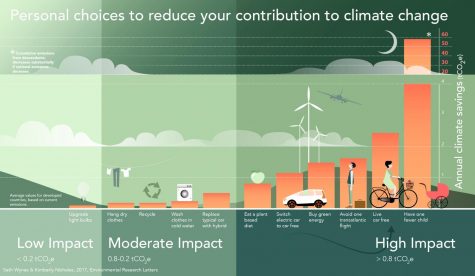Personal Choices are not the Superman of Preventing Climate Change
March 23, 2020

According to recent studies, 71% of global greenhouse gas emissions since 1988 were produced by just 100 companies. Still, many people preach the idea that, if every person tries to reduce their own carbon footprints through their personal choices, the problem of climate change would be eradicated. Many climate scientists, politicians, and journalists, however, believe that, rather than just relying solely on the individual to save the planet, we should instead combine it with sufficient governmental regulations on both the federal and international level, a speedy transition to renewable energy, and sustainable infrastructure, among many other things.
Students at Bergen Academies have similar opinions on the issue, many of which are lacking in hope in regards to any future environmental policies and the wellbeing of our planet.
For instance, AEDT junior Zareena Al-Shehab, vice president of the Environmental Science Club, said in an interview “I would say that it [climate change] is really bad and that our leaders aren’t doing enough to solve the problem and I believe that it’s just because most of them are old and they don’t believe that climate change is really going to affect them within their lifetimes.”
ABF junior Lucy Zanone also expressed pessimism about the environment, saying it would be impossible to recover from climate change. “But, like, people should still be, like, trying to make it better,” she added. “So, I support people’s decisions when trying to make small changes in their everyday lives and going to climate strikes and stuff, but I think that what’s going to make a big difference are changes in policies and big ticket items involving corporations’ efforts to decrease their footprint. I mean, the strikes probably do have some effect, but I just don’t think that they’re going to be that effective because the government really just wants to help the big corporations.”
So, would it make any difference if BCA students felt like they played a role in preventing climate change? Those who believe that to be the case argued that it is better to release no pollutants in the air at all rather than to release some. So, by driving to school, using a plastic water bottle, eating a lot of red meat, and other such activities that many do without thought, one is contributing to climate change more than he needs to be, even if it is by a small, seemingly insignificant amount.
Moreover, it makes being environmentally friendly more popular in society using a type of social influence known as behavioral contagion, which is the tendency for people to repeat a certain behavior after one person has exhibited it by.
As AEDT junior Adam Jezewski said, “Yeah, individual choices have some impact especially because they push a sentiment to actually care about the environment among larger groups of people, but it’s not the most important factor that’s going to change it all.”
Still, when asked if he thinks that the choices that individuals make have any impact on the fate of the planet or government policy, he had no optimism.
“No. Yeah, I’d say no,” he said. “I really don’t have hope. I’m just doing what I can so that, when it’s judgement day, I can say I’ve tried. Unless 70% of people are eco-freaks, which won’t happen, it doesn’t matter. It all depends on the big companies and who we’re getting our oil from, but most people don’t have the privilege to buy an electric car.”
So, what can you even do, and will it make any difference? Although the answer is debatable, doing what you can is better than doing nothing. Because our economy relies on the concept of supply and demand, cutting back on your intake of animal products, driving less, and limiting your use of single-use plastics will lower the demand of such goods, and therefore their production, even if it is by a very small amount. This will thus lower your carbon footprint, while also spreading this idea of environmental sustainability to others. Moreover, attending climate strikes could have some impact on governmental policy, as evident in Germany’s strengthening of their climate action plan just a few days after approximately one million people took to its streets in protest on September 20, 2019. Voting for people who understand the severity of climate change and are willing to do something will also have an impact on policy; if more people had done so in the 2016 election, then the US would still be involved in the Paris Climate Accord and many environmental regulations would still be in place. When climate change is on its way to destroying our planet and all of the biodiversity that has evolved on it over millions of years, this is not the stance that one of the largest, most internationally significant countries should take. As individuals, we must do what we can to change it.





